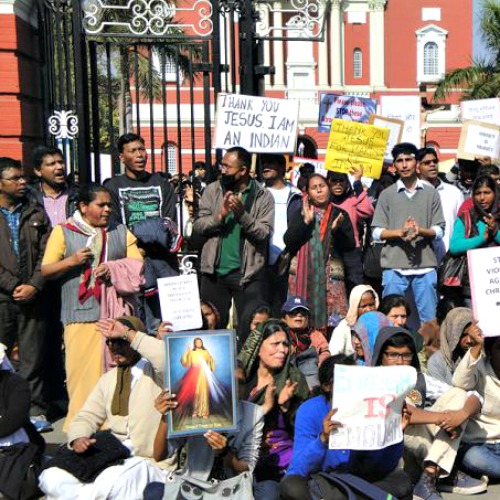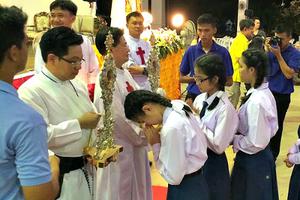Peaceful Protest Leads to Jail for Hundreds of India’s Christians
Police said those who protested recent attacks on Christian churches were detained because they weren’t authorized to gather on a public street outside of a church.

NEW DELHI — Police in the Indian capital of New Delhi arrested numerous Christians on Thursday who were participating in peaceful protests requesting that the government take action following a series of attacks on churches in the city.
“The Christian community in the national capital, New Delhi, staged a peaceful protest Thursday morning, on Feb. 5, for the second time in two months, demanding that the High Court monitor investigations into the attacks on five city churches since December last year,” Father Savarimuthu Sankar, spokesman for the Archdiocese of Delhi, told CNA Feb. 5.
The first attack in the past two months was an arson at St. Sebastian Church, Dilshad Garden, on Dec. 2. Then stones were thrown at Our Lady of Fatima, a Syro-Malabar parish in Jasola, during Mass on Dec. 7. A crib was found charred on the premises of the Church of the Resurrection in Rohini Jan. 4, and a Marian statue was destroyed at the Grotto of Our Lady of Graces in Vikaspuri on Jan. 14. On Feb. 2, St. Alphonsa’s was broken into, with Hosts desecrated and the monstrance and a ciborium and chalice stolen.
In response, Christians, including Catholics and those of various denominations, gathered in front of Sacred Heart Cathedral last week and stood in protest of government inaction, chanting and holding such placards as “Stop attacking churches,” “I am proud to be a Christian,” and “Enough is enough.”
According to Father Sankar, “Even before the protest began, the police began to use brutal force and arrested the leaders and people who were just beginning to gather in front of the Sacred Heart Cathedral, including priests and nuns.”
Among the protesters detained by the police were Father Susai Sebastian, Father Dominic Emmanuel, John Dayal, A.C. Michael, Jenis Francis and several elderly religious sisters.
Hearing of the arrests and the brutality of the police force, Archbishop Anil Couto of Delhi condemned the violence and said, “This is a sad incident.”
“I strongly condemn the action of the police who assaulted the priests, nuns and the elderly people, who were holding a peaceful demonstration in front of the church,” Archbishop Couto said.
“This is not acceptable in a democratic country such as India, and it is a blatant violation of fundamental rights enshrined in our constitution.”
Mukesh Meena, joint commissioner of the Delhi Police, told reporters the protesters were detained because “they did not have permission to protest outside the church, and we cannot allow them to protest on public roads,” the Press Trust of India reported. Meena told The Wall Street Journal that 350 people had been detained.
The Delhi prelate slammed the government’s behavior and said, “The community says it has lost faith in the Delhi Police, who have failed to solve the conspiracy that has led to the vandalism, arson and desecration of churches.”
“Instead of probing the crimes, the police have consistently tried to minimize them. Despite detailed complaints, the effort has been to list them as minor thefts.”
Father Sankar explained that, after the Dec. 2 attack on St. Sebastian’s, the Christian community had come out in large numbers marching to the Delhi Police headquarters, and the police promised a “thorough investigation, yet more than two months later, they have not announced any progress in the case.”
The community had been shocked by the desecration at St. Alphonsa’s, he said.
The parish’s pastor has alleged that the crime was meant to hurt the religious feelings of the community, rather than for material gain, as nothing of substance was stolen from the church.
Three donation boxes and other precious things were left untouched, but local police, “apparently under orders of the senior officers,” Father Sankar noted, “registered just a simple case of theft.”
Father Sankar described a memorandum by community representatives sent to Home Minister Rajnath Singh regarding the series of attacks on churches.
“It is quite clear that the Delhi Police have failed to give these crimes the attention they deserve and is trying to trivialize them,” the memorandum said.
It also charged that, “elsewhere in the country, the targeted and communal violence continues with its vicious hate campaign, physical violence, police complicity and state impunity in the persecution of the Christian community in many states of India.”
The community members cited the Human Rights and Civil Society group’s documentation of the death of two persons killed for their Christian faith in 2014, as well as 147 other cases of persecution of Christians. An analysis of the data shows Chhattisgarh state topping the list with 28 incidents of crime, followed closely by Madhya Pradesh with 26, Uttar Pradesh with 18 and Telengana with 15 incidents.
The memorandum also alleged that much of the violence has taken place after the government of the National Democratic alliance, headed by Narendra Modi, came into power in May 2014.
Violence peaked between August and October, with 56 cases, before a second resurgence of 25 cases during the Christmas season. The violence has continued into 2015, with more Catholic churches in the city targeted as incidents continue in other states.
The memorandum submitted to the government also noted that more than half of the violence is constituted by threats, intimidation or coercion, often with the police looking on. The two cases of deaths in anti-Christian violence were reported from Odisha and Andhra Pradesh.
The memorandum demanded that the “government takes urgent and effective measures to restore the rule of law and curb the targeted and communal violence. … The guilty must be traced, and action under the law should be taken.”
It further said that “police officers must be held accountable for communal crimes in their jurisdiction. … In Delhi, we demand a special investigating team be set up to investigate the five acts of violence against the Catholic churches, monitored by the High Court of Delhi.”
On Saturday, the Kashmir Monitor said that Singh had directed the Delhi Police to improve security at the city’s churches.
Protests against government inaction in New Delhi have taken place across India, including in Mumbai, Dimapur and Bangalore. In some places, Christian protestors were joined by Muslims.
In Mumbai, Bishop Agnelo Gracias, an emeritus auxiliary bishop of the city, said, “The central government’s deafening silence is something we are not happy about. This is making us disillusioned with the state of affairs.”
He added, “I believe these attacks are not isolated incidents. I would use the allegory of water lilies in a pond. On the surface each appears to be an individual flower, but beneath the surface, they are all connected to a common stem.”
- Keywords:
- antonio anup gonsalves
- archdiocese of new delhi
- catholc faith
- india
- national catholic register
- persecution of christians















